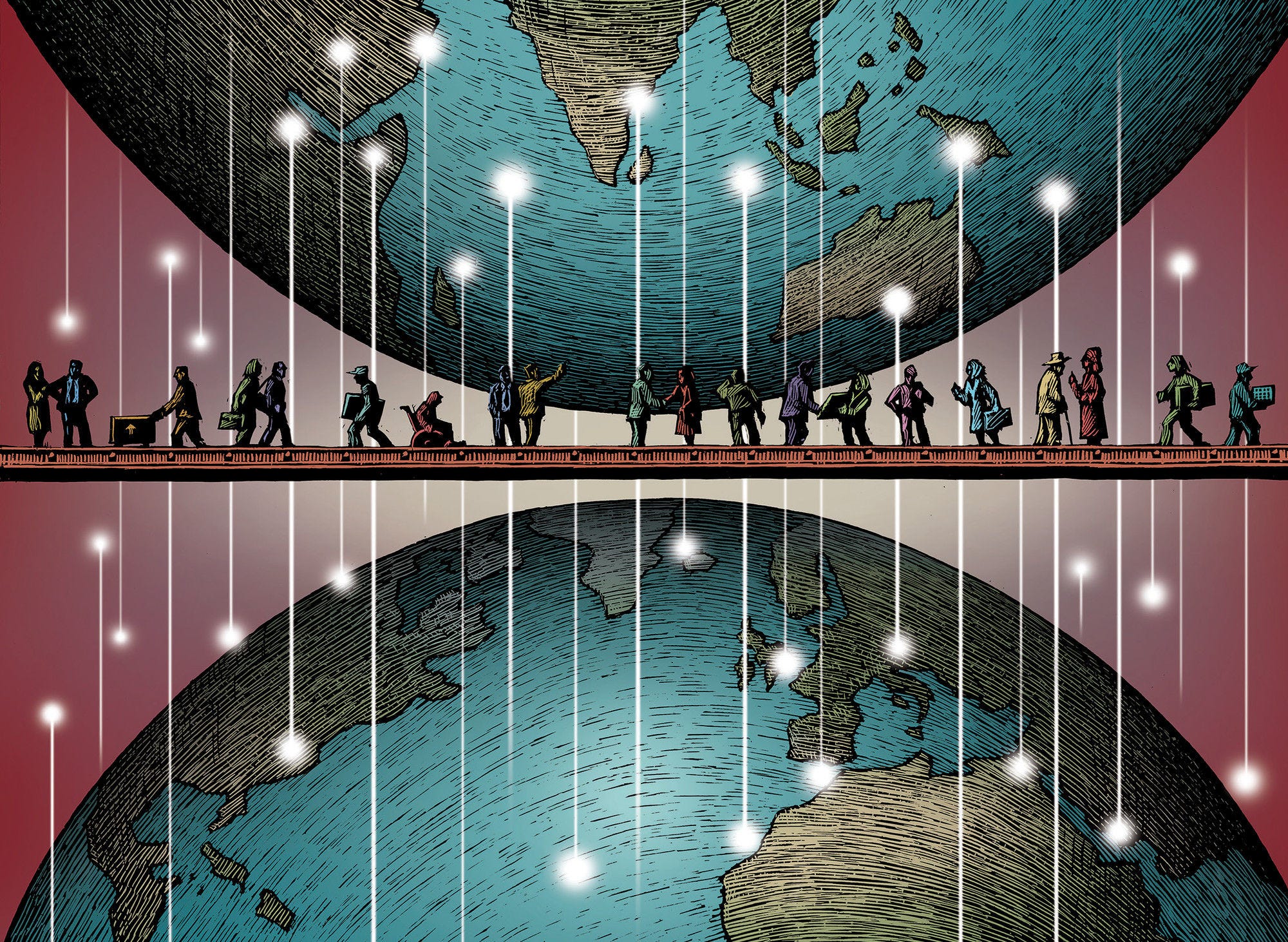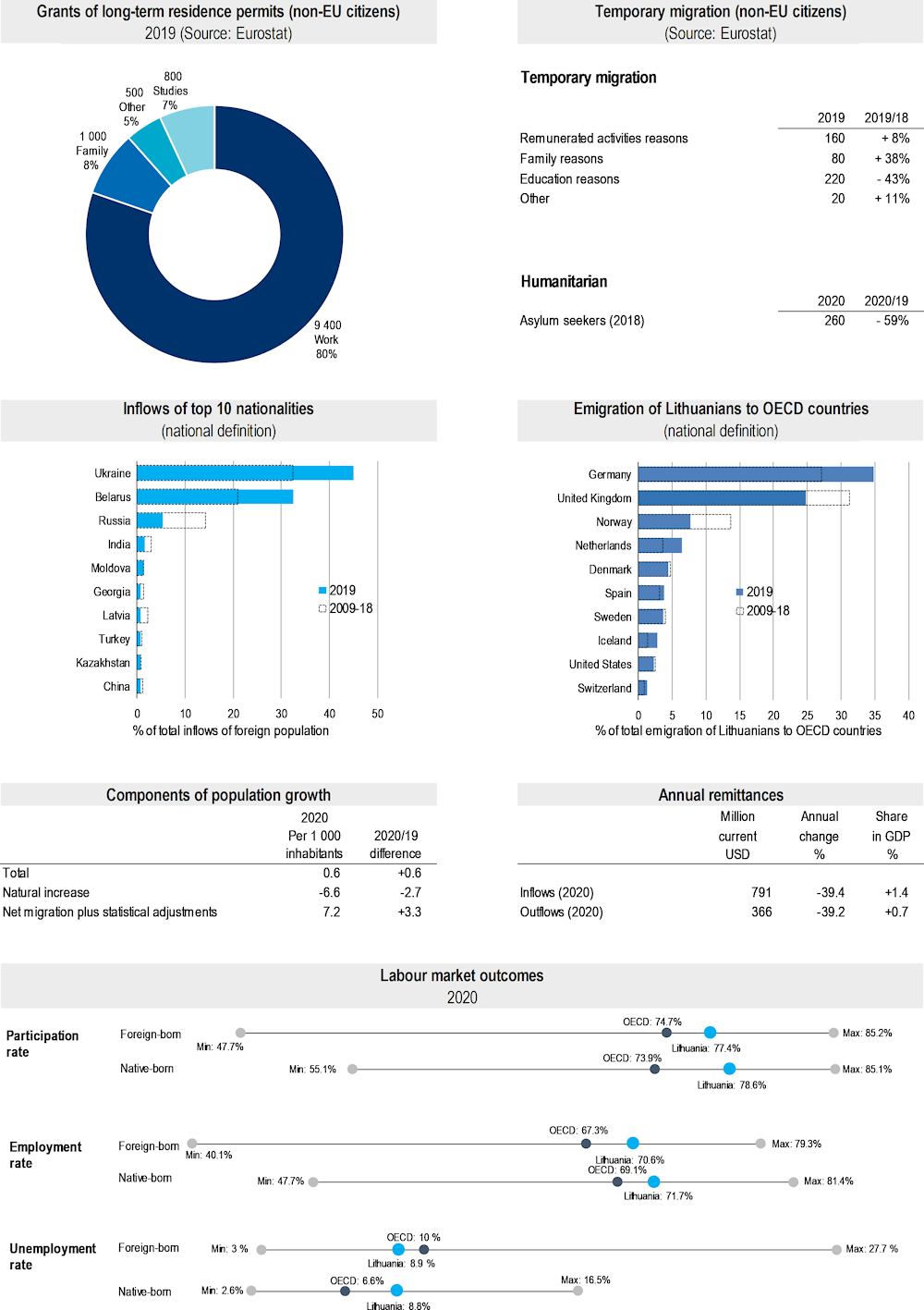In 2019, 21 000 new immigrants obtained a residence permit longer than 12 months in Lithuania (excluding EU citizens), 79.6% more than in 2018. This figure comprises 87.1% labour migrants, 5.1% family members (including accompanying family), 5.3% who came for education reasons and 2.5% other migrants. Around 200 short-term permits were issued to international students and 200 to temporary and seasonal labour migrants (excluding intra-EU migration). In addition, 10 000 intra-EU postings were recorded in 2019, an increase of 230% compared to 2018. These posted workers are generally on short-term contracts.
Ukraine, Belarus and Russia were the top three nationalities of newcomers in 2019. Among the top 15 countries of origin, Ukraine registered the strongest increase (3 100) and India the largest decrease (‑61) in flows to Lithuania compared to the previous year.
In 2020, the number of first asylum applicants decreased by ‑59%, to reach around 260. The majority of applicants came from Russia (65), Belarus (80) and Tajikistan (40). The largest increase since 2019 concerned nationals of Belarus (65) and the largest decrease nationals of Russia (‑200). Of the 400 decisions taken in 2020, 22.9% were positive.
Emigration of Lithuanians to OECD countries decreased by ‑35% in 2019, to 18 000. Approximately 30% of this group migrated to Germany, 14% to Norway and 11% to the Netherlands.
In October 2019, the Lithuanian Migration Information System (MIGRIS) was launched. Clients use the system to submit electronic applications for the issue or renewal of residence permits and to register for an appointment to meet a Migration Department specialist.
In January 2019, the Constitutional Court established the right of the same‑sex spouse or partner who is a foreign national to family reunification in Lithuania with their spouse who is a citizen of the Republic of Lithuania.
Since September 2019, issue or renewal of a temporary residence permit may be refused if a foreign student enrolled in a higher education and research institution fails to progress in their studies and no justified reasons have been presented.
On 1 January 2020, a readmission agreement with Ukraine entered into force.
Since January 2020, asylum applicants have the right to take up employment if the Migration Department does not take a decision on granting asylum within six months from the lodging of a claim.
As a response to COVID‑19, between March and June 2020 the government approved a quarantine regime and banned foreigners from entering Lithuania; in November 2020, the quarantine regime was reintroduced. During the first quarantine, the procedure of issuing temporary residence permits was simplified for foreigners working in Lithuanian companies engaged in international commercial/freight transport. The Migration Department granted a tolerance period during the quarantine, and for two months from the end of the quarantine, for foreigners whose period of legal stay in Lithuania ended when quarantine was announced but who could not leave Lithuania due to no fault of their own.
Since September 2020, applications for the issuance of temporary residence permits such as EU Blue Cards or for lecturers or researchers and their family members may be examined once they are lodged on MIGRIS.
Due to the political situation in Belarus, since September 2020 Belarus citizens may obtain a multiple‑entry national visa valid for six months under facilitated conditions. Family members of Belarusian nationals who are in possession of a national visa or a temporary residence permit may also obtain a national visa under the same facilitated conditions.
In 2020 the Ministry of the Interior launched a procedure according to which a foreigner may acquire the status of an electronic resident (e‑resident). This digital ID will give access to the administrative, public or commercial services provided in Lithuania by electronic (remote) means.
A new provision was introduced in 2020 stipulating that a child of stateless persons lawfully residing in the country is a citizen of Lithuania who has acquired citizenship by birth, regardless of their place of birth.
For the first time, an annual quota (32 200 for 2021) was approved for foreigners entering Lithuania for the purpose of taking up employment in an occupation included in the list of Shortage Occupations. Once the quota is exhausted, foreigners whose occupation is included in the list will be required to obtain a work permit.
Since March 2021, Blue Card holders may start employment immediately after they have lodged their application if the position is labour-market tested or labour-market-test exempt. Foreign students at Master level may work without any restrictions.
For further information:

